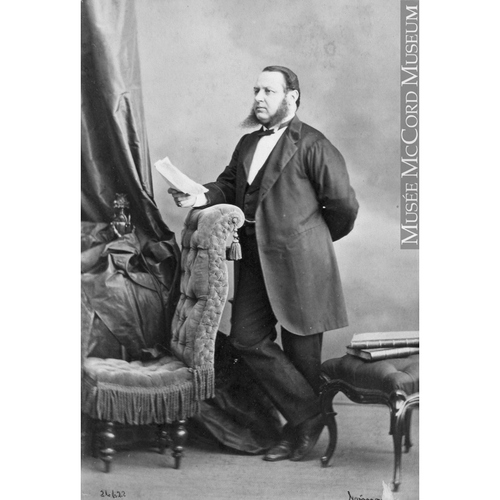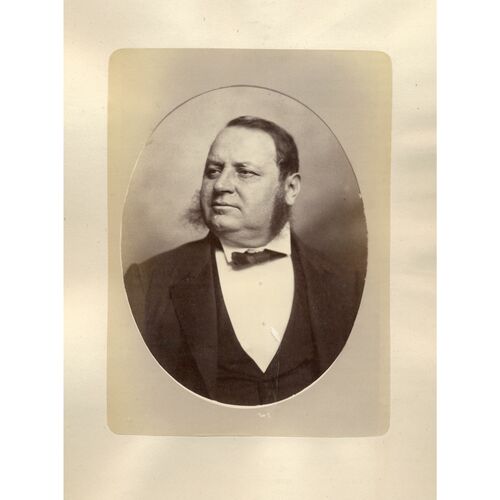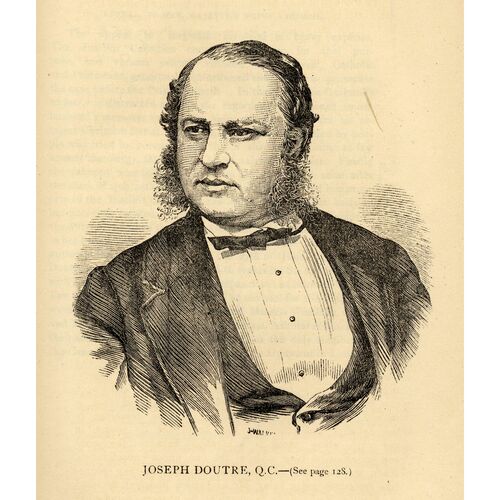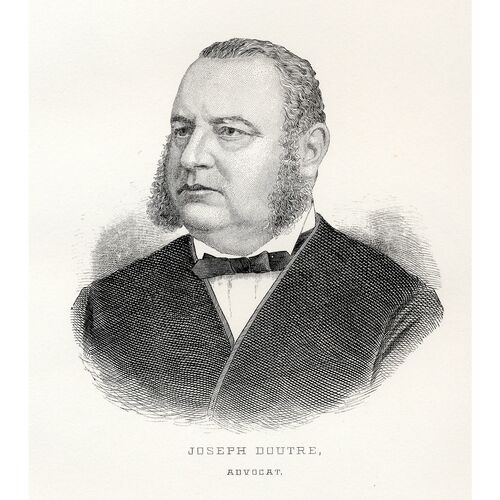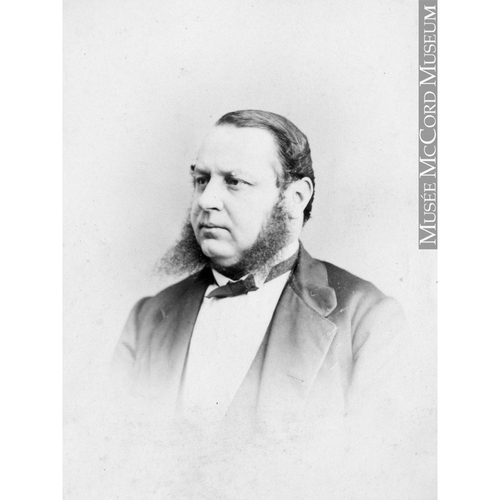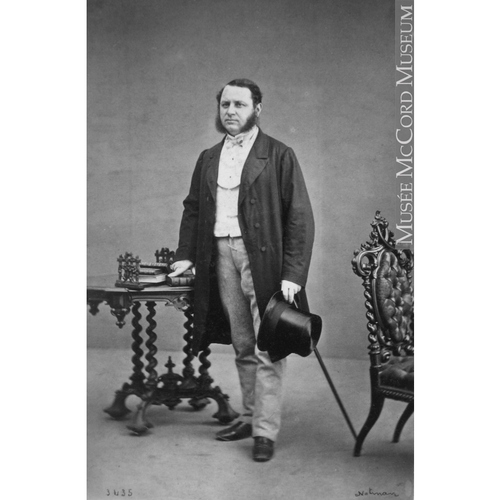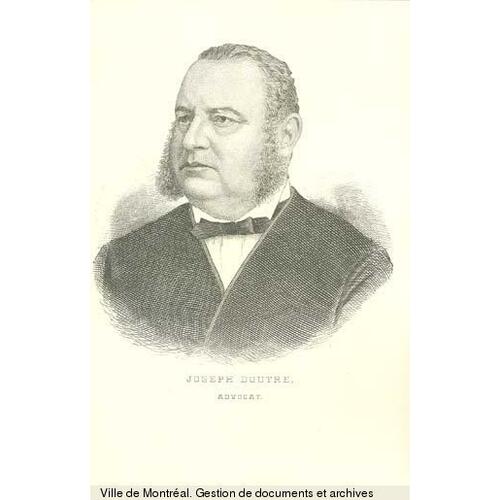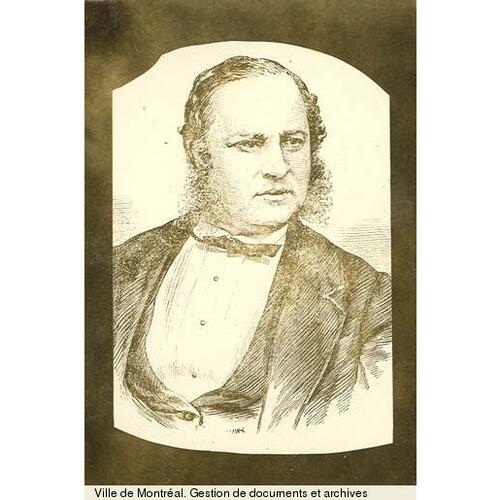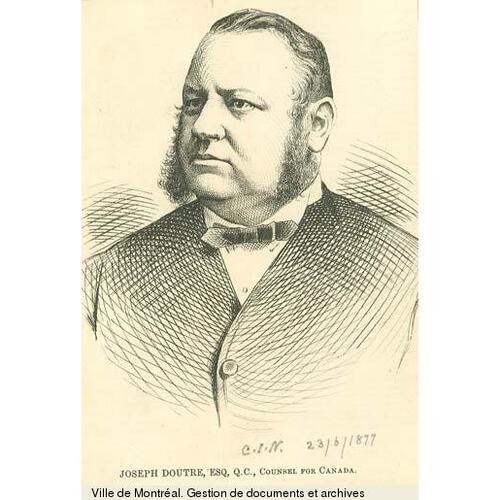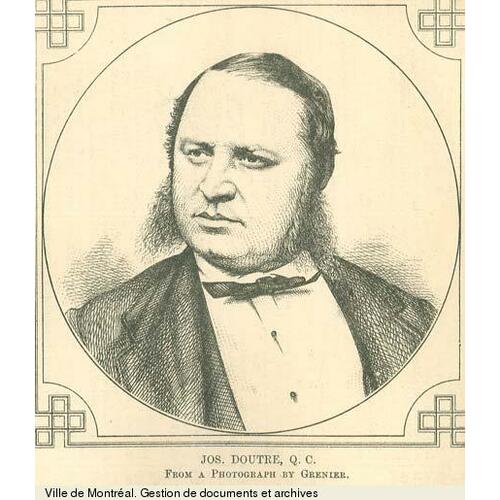DOUTRE, JOSEPH (baptized Joseph-Euloge), journalist, writer, and lawyer; b. 11 March 1825 at Beauharnois, Lower Canada, son of François Doutre and Élisabeth Dandurand, dit Marcheterre; d. 3 Feb. 1886 in Montreal, Que.
Joseph Doutre spent his childhood in the village of Beauharnois which was in the seigneury of the same name. His father was a shoemaker and the sexton of the church of Saint-Clément there. That Joseph Doutre, the most determined adversary of the church in Quebec during the latter half of the 19th century, was brought up in the shadow of the altar is not the least paradoxical aspect of his eventful life. He probably attended primary school in Beauharnois before beginning classical studies at the Petit Séminaire de Montréal in September 1836. The principal of the seminary at that time was Joseph-Alexandre Baile, a French Sulpician. It is worth noting that even at the height of his anti-clerical campaigns Doutre never disparaged his former teachers in any way. At the seminary he met young people whom he would re-encounter later, such as Toussaint-Antoine-Rodolphe Laflamme*, his colleague at the bar, Magloire Lanctôt*, and William Oscar Dunn, father of Oscar Dunn, a journalist who was a follower of the French ultramontane author, Louis Veuillot. When he left the seminary in 1843, Doutre studied law under Norbert Dumas, Augustin-Norbert Morin*, and finally Lewis Thomas Drummond.
Doutre began to write and publish even before he was called to the bar on 30 April 1847. He contributed articles first to the Mélanges religieux and L’Aurore des Canadas, both published in Montreal. On 17 and 21 Nov. 1844 he had a short story entitled “Faut-il le dire! . . .” in Le Ménestrel (Quebec). The first two instalments of his novel, Les fiancés de 1812, were also distributed to subscribers at this time. Through Doutre, Montreal was suddenly exposed to the same literary currents as Paris in the field of the novel. On the banks of the St Lawrence, the law student was endeavouring to imitate Eugène Sue, whom Charles-Augustin Sainte-Beuve considered the novelist most in vogue in France and Europe. Sue owed his success to his “Mystères de Paris,” first published in Le Journal des Débats (Paris) from 19 June 1842 to 15 Oct. 1843. The editor of Le Courrier des États-Unis, Théodore-Frédéric Gaillardet, republished Sue’s novel in the Semaine littéraire; hence Montreal bookseller Édouard-Raymond Fabre* could deliver the episodes of “Mystères de Paris” to eager readers as they were printed in New York. Sue’s novel had a truly seminal influence on Doutre. Reading it led him to self-knowledge; four years after the publication of Les fiancés de 1812 he recalled: “I responded to the vitality in me that rebelled against the indifference of the times.” In 1844, at the age of 19, with Sue as his model, he began his struggle against the prejudices, ignorance, and apathy of French Canadians as well as against a religion too often degenerating into Pharisaism. He attacked religious intolerance, the hypocrisy of “those sanctimonious knaves, who spend their lives in a church or robed in a priest’s cassock,” but who were none the less shady in their business dealings. Hence for him the reading of novels such as “Mystères de Paris” provided “an enlightened school of private and public discipline,” for it effectively revealed “the vices of the social system, [and] the lack of public institutions for the encouragement of virtue.”
Doutre begged public indulgence for his work. His ambition was “to give some stimulus to literature amongst us.” But the final product did not come up to the young man’s aspirations; in expressing his ideas, which were very modern from the social point of view, he had to rely on his as yet undeveloped natural talent, and he offended many sensitive readers. The result was that the Mélanges religieux judged Les fiancés de 1812 to be “a sufficiently immoral work that fathers would forbid their children to read it, and that a woman who began reading it could not but blush and cast away such a production.” Two years later, in 1846, Doutre published “Le frère et la sœur,” a short story obviously inspired by Chateaubriand’s René, but with the theme of incestuous temptation watered down. In it he looked back on his years at Beauharnois when he had “more than once trodden the shady paths of the seigneurial domain. More than once also its woods had echoed with the harmless sound of [his] inexpert gun.” Doutre wasted no further time on purposeless experiments with the pen; the practice of law and the activities of politics were henceforth to demand all his attention.
Despite the assertions of a number of historians, he was not one of the young men who, on 17 Dec. 1844, had laid the foundations of the Institut Canadien. But he soon joined this group, became one of its acknowledged leaders, and in July 1847 was amongst the 13 young men who formed the initial nucleus of contributors to L’Avenir of Montreal. Doutre at first favoured the Reform party; indeed in April 1848 he and his friends were in a position to boast in their paper that they had helped Louis-Hippolyte La Fontaine* to get elected and they called themselves “the true friends of the government.” But the next month the “Thirteen” rallied behind Louis-Joseph Papineau* who was attacking the union of Upper and Lower Canada and was bringing the revolutionary principle of “nationalities” (self-determination) to bear upon Canadian affairs. From that date Doutre stood out as one of the most persistent opponents of the ministerial party. When L’Avenir in August 1848 published “La tuque bleue,” a satirical piece probably written by Louis-Antoine Dessaulles* but attributed to Charles Daoust* by George-Étienne Cartier*, it was Doutre who fought a duel with Cartier, the latter considering himself to have been ridiculed by this scurrilous document.
The clergy, convinced that L’Avenir was seeking “to spread revolutionary principles,” as Bishop Ignace Bourget wrote in his pastoral letter of 18 Jan. 1849, began to support the party of La Fontaine and Robert Baldwin* in an increasingly open fashion. When L’Avenir advocated annexation to the United States and demanded the suppression of tithes, clerical opposition to the Rouges stiffened and became so marked that Doutre believed, or was determined to believe, that there existed a letter from Lord Elgin [Bruce*] to the bishops, asking them to suppress the annexationist movement. Doutre published a diatribe in L’Avenir on 24 Nov. 1849 with the provocative title “Proposition infâme! Le peuple au marché!” A year later, under the heading of “Chronique religieuse,” he published a long screed in which he gave vent to his anticlericalism with a vehemence almost unparalleled in French Canadian literature. Doutre was getting even with the “mixed, politico-religious party,” which counted on the people’s ignorance stopping them from casting “every four years a disinterested vote for the management of our public affairs.” He felt that the source of this ignorance was the religious instruction given in schools and colleges in the grip of the clergy: “it is the sole cause; for here in brief are the social guide-lines of the mass of our population: eat and pray to God. . . . They are taught to scorn and flee all the rest.”
Clerical hostility to the arguments of L’Avenir accounts for the exasperated tone of this statement. The evolution of Canadian politics since 1848 had decisively influenced Doutre’s thinking: in 1850 he had reached the point where he upheld the essential tenet of political liberalism, separation of church and state, and as a consequence supported the exclusion of the clergy from politics and non-denominational, secular education. At 25 years of age, Doutre had adopted the line of action from which he would never deviate.
On 17 Dec. 1850, at the sixth anniversary of the founding of the Institut Canadien, he gave a speech outlining the goal of a truly modern education. Pointing out that a young man leaving college had no understanding of real life and of words such as income, taxes, trade, politics, elections, and public law, or even of words relating to sport, fashions, dancing, and the theatre, he stressed that thanks to the Institut Canadien this same young man could henceforth find his place in society immediately. According to Doutre, the institute had opened to all, without distinction of class, “the prospect of human greatness and of the honours attaching to high rank in public life”; hence one saw young people engaged in technical trades competing with men from the liberal professions. The use of the spoken word was no longer the sole preserve of members of the bar, the art of writing was within the reach of all, “and everywhere,” he added, “you will find the immense influence of the press in the hands of young men whose appearance in the world of politics only dates from the formation of our societies for meetings and discussions.”
It was because the Institut Canadien was a lay creation, free of clerical domination, that it was on the road of progress. Doutre had given proof of this a contrario, when in L’Avenir of 6 April 1850 he condemned a “minor coup d’État” of the library committee of the Institut Canadien in Quebec City which had voted to cancel its subscription to L’Avenir. This committee included the abbés Louis Proulx*, Jean Langevin*, and Elzéar-Alexandre Taschereau*, representatives of the clerical party, and the “Reverend” Joseph-Édouard Cauchon, representative of the ministerial party: thus in composition it reflected what Doutre branded as “the mixed, politico-religious party.” “The pulpits and the confessional,” he protested, “were not enough for it; it has seized control of a public institution, founded on the example of the efforts of the youth of Montreal; it has done so in order to repress thought and opinion there, to forbid discussion and examination of them, to stop the spread of doctrines which are too sound not to be understood and accepted, finally to give [this institution] the appearance of a gathering of ignoramuses which they know so well how to do. “
When L’Avenir temporarily ceased publication in January 1852, Doutre began to take an increasingly prominent role in the Institut Canadien, whose president from May 1852 was “citizen” Pierre Blanchet. The progressives prevailed over the moderates; the latter finally decided to set up a rival association, the Institut National, for which they secured Bishop Bourget’s patronage. This secession in no way stayed the progress of the Institut Canadien, if we are to judge by the Olympian detachment with which Doutre noted in the “eighth annual report,” published in December 1852, that during the course of the year nine members had left the institute, two “to join a new society formed last spring.”
Doutre was active in a variety of ways. On the occasion of a competition organized by the Institut Canadien in 1851, he had won a prize given by Legislative Councillor Pierre-Amable Boucher de Boucherville for an essay entitled “Du meilleur emploi qu’un citoyen peut faire de son existence tant pour la société que pour sa famille.” The following year he published “Les sauvages de Canada en 1852,” a talk on the Iroquois of Caughnawaga which he had given to the institute; he characterized this talk as “observations rather superficially assembled over two or three years, and tacked together in a twenty-four hour study carried out on the spot and copied from life.” His forceful thinking and zeal for work so impressed his colleagues that in November 1852 they elected him president of the institute for a one-year term; it was under his presidency that the association was incorporated. At the beginning of 1854 it was able to acquire a large building on Rue Notre-Dame and a journalist and friend then claimed: “The Institut Canadien is now built on solid ground.”
That year was to be particularly auspicious for the group. Although Doutre was not among the 11 members of the institute elected to parliament, he distinguished himself at its “convention” on the abolition of seigneurial tenure. Doutre had been urging the abrogation of tenure since 1849, and had clearly indicated in L’Avenir of 4 May 1850 that on this question he parted company with Louis-Joseph Papineau and Louis-Antoine Dessaulles, who were themselves seigneurs. He had lived in a village that was part of a seigneury, and this may have been the origin of his opposition to such a system. But it was in educational issues that he was particularly active. When bookseller Édouard-Raymond Fabre, a close friend of Papineau and a founder of the Liberal newspaper Le Pays (Montreal), died in July 1854, Doutre spoke in his praise to the members of the institute. He emphasized Fabre’s strength of character in acquiring a businessman’s training at a time when “commercial education establishments still had to be created.” “Even today,” Doutre went on, “the necessity for an education derived from sources other than Greek or Latin authors is barely appreciated.”
Doutre wanted not only the practical training he had already demanded in the columns of L’Avenir but also non-denominational instruction in schools, as was being advocated by another “convention” of the institute, focused this time on education. However, it was an inopportune time to insist on non-denominational teaching. The bishop of Toronto, Armand-François-Marie de Charbonnel*, and the Catholics of Canada West were fighting fiercely for the de jure recognition of separate schools. Consequently Doutre, who probably foresaw that he would enter politics in the near future, deemed it prudent to ease off a little. Therefore, during the sessions at the “convention,” he showed admirable moderation; while supporting the principle of non-denominational schools, he prudently decided to shelve the thorny question of existing denominational schools and wait “until the public complains about the present system.”
Doutre no doubt had his eye on a seat in the Legislative Council, now that it was an elective body. In September 1856 he ran in the division of Salaberry, but lost to the ministerial candidate, Louis Renaud*. He tried his luck again in 1863, running in Laprairie County for election to the Legislative Assembly. He met with another defeat, this time at the hands of Conservative candidate Alfred Pinsonnault. Doutre then gave up the attempt at elective office, but now harboured a much stronger hatred for the clergy, to whose opposition he attributed his successive defeats.
Meanwhile the bishops had come down hard on the Institut Canadien. Following the publication of Bishop Bourget’s three pastoral letters on 10 March, 30 April, and 31 May 1858, 138 members resigned from the institute to set up a rival society, the Institut Canadien-Français. The bishop of Montreal vigorously rejected the free-thinking opinions of the leading members of the Institut Canadien, singling out Doutre and his brother-in-law Charles Daoust in particular.
At a banquet given in February 1858 by political friends of Daoust, who was editor of Le Pays and Liberal representative for Beauharnois County from 1854 to 1857, Doutre had returned to the question of non-denominational schools, stating that “the principle of mixed schools” seemed to him “the most rational, and the one that must some day prevail.” But the right moment for attaining this objective was not at hand; “I do not think,” Doutre continued, “that the state of our public education is such that one should apply this principle as an absolute rule, or as the main basis of our system.” This was a public declaration, printed in Le Pays of 16 Feb. 1858, but Doutre had revealed what he really thought in a letter written to George Brown* five days earlier: the Catholics were overly excited and the “Jesuits must be met with their own arms – diplomacy.” Doutre was certain that one day it would be possible to give Canada the nondenominational system advocated by Brown, for, he added, the success the Jesuits were enjoying was nearing its end.
Bishop Bourget obviously was unaware of the contents of this letter, but Doutre had shown his hand sufficiently in his public speech for the bishop to detect the obstinate champion of the liberal tenet of separation of church and state. If there had been the slightest ambiguity, Daoust dispelled it on this same occasion by declaiming “that the church and the state ought to have a separate existence, each live its own life, and not identify with each other in a common action.” The bishop quoted this extremely explicit declaration; he indignantly called it “impious language,” and to stigmatize his liberal opponents more effectively he resorted to arguments elaborated a quarter of a century earlier in Gregory XVI’s encyclical Mirari vos.
Ostracized by the clergy and unable to enter politics, Doutre concentrated almost exclusively on his legal practice. One of his first partners was Joseph Lenoir*, dit Rolland, a talented poet. Among the lawyers who subsequently became his partners were his brother-in-law Charles Daoust, his brothers Gonzalve* and Jean-Baptiste, his cousin Raoul Dandurand*, and Médéric Lanctot*; others trained under his direction, notably Wilfrid Laurier*.
His competence and passion for work placed him in the forefront of his profession. He was made a qc on 15 Aug. 1863, under the administration of George Brown and Antoine-Aimé Dorion*, and was often a member of the council of the bar and of its library committee; from 1864 to 1866 he was an examiner and from 1867 to 1868 bâtonnier. He was a corresponding member for the Société de Législation Comparée of Paris from 1872, and contributed regularly to legal publications such as the Lower Canada Jurist and the Legal News in Montreal. In 1880 John Lovell and Son published his Constitution of Canada: the British North America Act, 1867, its interpretation, gathered from the decisions of courts, the dicta of judges and the opinions of statesmen and others; to which is added the Quebec Resolutions of 1864, and the constitution of the United States; the contents of its 414 pages are clearly indicated by the title.
Doutre argued a number of important cases. In 1857 he had become counsel for the censitaires appearing before the court established to settle the consequences of the abolition of seigneurial tenure. Three years later he agreed to defend a French bank cashier by the name of Lamirande who was guilty of misappropriating funds and who had taken refuge in Canada. But the case that brought him most sharply to public attention was undoubtedly the Guibord affair, to which his name is still attached.
From 1858 the rift between the Institut Canadien and the bishopric of Montreal had continued to widen. Despite the archbishop of Quebec’s counsel of prudence, Bourget in that year rigorously applied to the library of the Institut Canadien the rules of the Index, the violation of which ipso facto entailed excommunication; in so doing he clashed with liberal opinion which denied any one the right of surveillance and prohibition in respect of books and reading materials. Liberals held that every individual had the right to choose his own intellectual fare; the cases of poisoning that might result were only accidental inconveniences, amply compensated for by the superior blessing of liberty.
Doutre, whose literary career had begun under the aegis of Eugène Sue, and who, because of his liberalism, found himself barred from the political office to which his talents and aspirations entitled him, must have felt this act of episcopal authority as a stinging blow. Hence it is perhaps surprising to find him on the committee appointed in October 1863 to “inquire into the means best suited to smooth out the difficulties that have arisen between His Lordship the Bishop of Montreal and the Institut.” This encounter, which took place under the bishop’s roof, proved fruitless and although Doutre and 16 other members of the institute applied to Pius IX on 16 Oct. 1865 to have the censure removed, the Institut Canadien, of which Doutre again became president in May 1867, saw its 1868 Annuaire put on the Index by the Holy Office on 7 July 1869.
Shortly after sending to Rome a second appeal, signed by Doutre, the Institut Canadien lost one of its members, printer Joseph Guibord*, who died suddenly on 18 Nov. 1869. Confronted with the refusal of the ecclesiastical authorities to grant the deceased a Catholic burial, his widow, through Adolphe and Joseph Doutre, as well as Toussaint-Antoine-Rodolphe Laflamme, instituted proceedings in the Superior Court of Montreal against the parish council of Notre-Dame. The case gave Doutre, one of the two counsel for the plaintiff, the opportunity not only to arouse national interest in the Liberal opinions he had been proclaiming for nearly a quarter of a century, but also to mount a violent, occasionally truculent, verbal attack against his ultramontane enemies, represented by the Jesuits whom he, and in Raoul Dandurand’s view many influential Liberals, suspected of being the instigators of Bishop Bourget’s attack. Had not the Jesuit Firmin Vignon set up the Union Catholique at the Collège Sainte-Marie in September 1854 to thwart the Institut Canadien?
Doutre carefully excluded from the Guibord affair “the venerable priests of Saint-Sulpice, among whom was the parish priest then in office”; he poured his concentrated venom into tirades reminiscent of the most famous anti-Jesuit diatribes. “There is in the world,” he exclaimed, “a circle of men who are in permanent conspiracy against all that constitutes the material and spiritual happiness of humanity, a circle of men who call themselves Catholics and who have been proscribed thirty-seven times by the Pope and the princes of all Catholic countries.” Rising to further heights, he burst into an invective worthy of Michelet: “Let honour be rendered to the Indians of this continent, who had begun to rid the land of Canada of the first seed of the holy Society of Jesus!” And what was the result of the Jesuits’ influence since their return to Canada? “A few years sufficed to condemn our population to the most abject ignorance. They seized possession of everything, with the most innocent air possible. The Bishop of Montreal enrolled in their service. As a Jesuit? As a blind tool? We do not know. Through the Bishop of Montreal, they controlled the Board of Public Instruction, the choice of school texts [and] that of institutions, the direction of studies and courses in the primary and model schools.” Against the advancing conquest of the ultramontane troops in the field of education, and, more generally, in secular structures, there remained one dyke, one bastion which “alone” was left “standing”: the Institut Canadien. Therefore upon it alone “all efforts” had been “concentrated” for years.
Thus, in his argument as counsel, Doutre pinpointed the central problem beneath the antagonism between the Liberals and the Ultramontanes – the attitude that should be adopted to a world born of the intellectual and political revolution of the 18th century, and especially of the programme of civil and religious liberties proclaimed in the Declaration of the Rights of Man and of the Citizen. If Guibord, the target of ecclesiastical censure, received burial in a Catholic cemetery, it would be a victory for the Institut Canadien, and the liberalism it embodied, over religious authority; if he did not, his burial would be a variant of the custom of “burial in unconsecrated ground,” which at this same period liberals in Belgium saw as further confirmation of the political domination of the clergy.
The rest is well known. Guibord’s widow, or more precisely the Institut Canadien, won its case in the Superior Court on 2 May 1870 with Judge Charles-Elzéar Mondelet* presiding. This judgement was reversed by the Court of Revision and the Court of Appeal, but was upheld on 21 Nov. 1874 by the Judicial Committee of the Privy Council. On 16 Nov. 1875 Guibord’s remains, which had been in the vault of the Protestant cemetery at Mount Royal since November 1869, were solemnly transported to the Catholic cemetery of Côte-des-Neiges with an escort of cavalry and foot-soldiers.
It was a Pyrrhic victory for Doutre. In fact the Institut Canadien, which he saw as the last rampart of radical liberalism, was slowly breaking up under the irresistible force of the mounting tide of ultramontanism. Several of its best-known members had died or made their submission to the church, so that by the beginning of 1886 La Presse could claim that the Institut Canadien no longer existed except “in name.”
But Doutre did not surrender. According to the testimony of Laurent-Olivier David*, he was one of the few liberals who, having withdrawn from the church, did not recover the faith of his childhood. “I had ambition,” he admitted to his colleague Rodolphe Laflamme, “I thought I had enough talent and energy to make my way; I saw [others] pass in front of me and my friends, and rise to honours, men who were of no merit; we were ostracized as a result of political opinions and reforms that were very questionable; I cannot pardon the clergy for the wrong it has done us.”
On 28 Sept. 1858, at Montreal, Doutre had married Angéline, the daughter of Jean-Baptiste Varin and Hermine Raymond. Widowed the following year, he married Harriet Green, a native of Vermont, and they had six children, three boys and three girls. He died on 3 Feb. 1886 in Montreal, and was buried in the Protestant cemetery at Mont-Royal. When one considers his life, marked by so much activity and conflict, one notes with surprise that Doutre was but 60 years old.
Less than a year earlier his unbending ultramontane opponent, Bishop Ignace Bourget, had passed away. “With a little more conciliatory spirit on both sides,” Doutre confided to his cousin Raoul Dandurand and to Honoré Mercier*, “perhaps we would have found some common ground.” To be sure, but, even when the characters and intractable convictions of the two men are left out of account, it must be noted that a diehard ultramontanism and an uncompromising radicalism had clashed. If these two ideologies were in such opposition, it was not, essentially, because their religious or non-religious principles were contradictory but because each wanted to impose itself on the community.
Joseph Doutre was the author of Constitution of Canada: the British North America Act, 1867, its interpretation, gathered from the decisions of courts, the dicta of judges and the opinions of statesmen and others; to which is added the Quebec Resolutions of 1864, and the constitution of the United States (Montreal, 1880), and of a speech printed in Cour supérieure, Montréal; plaidoiries des avocats: in re Henriette Brown vs. la fabrique de Montréal, refus de sépulture (Montréal, 1870), 35–64. He is known to have written one novel, Les fiancés de 1812; essai de littérature canadienne (Montréal, 1844), and some novellas: “Le frère et la sœur” and “Faut-il le dire! . . . ,” printed in Contes et nouvelles du Canada français, 1778–1859, John Hare, édit. (1v. to date, Ottawa, 1971– ), I: 168–92. Doutre also wrote “Du meilleur emploi qu’un citoyen peut faire de son existence tant pour la société que pour sa famille,” published in L’Institut canadien en 1852, J.-B.-É. Dorion, édit. (Montréal, 1852), 144–92; “Les sauvages du Canada en 1852; Caughnawaga; les Iroquois; leur constitution politique et sociale; leur langue; usages, coutumes, superstitions,” and “Notice biographique sur le feu Édouard R. Fabre, Esr. . . .” in L’Institut canadien en 1855, J.-L. Lafontaine, édit. (Montréal, 1855), 190–225 and 117–49 respectively.
AP, Saint-Clément (Beauharnois), Reg. des baptêmes, mariages et sépulture, 11 mars 1825. Arthur Buies, Une évocation: conférence faite à la salle de “La Patrie” jeudi, le 6 décembre 1883 ([Québec, 1883]). L. C. Clark, The Guibord affair (Toronto and Montreal, 1971). Raoul Dandurand, Les mémoires du sénateur Raoul Dandurand, Marcel Hamelin, édit. (Québec, 1967). L’Avenir, 16 juill. 1847–janv. 1852. La Patrie, 4 févr. 1886. La Presse, 3 févr. 1886. La Vérité (Québec), 13 févr. 1886. Bernard, Les Rouges. Pierre Beullac et Édouard Fabre Surveyer, Le centenaire du barreau de Mont(1861–1942)réal, 1849–1949 (Montréal, 1949). Thomas Chapais, Mélanges de polémique et d’études religieuses, politiques et littéraires (Québec, 1905), 93–94. L.-O. David, Histoire du Canada depuis la Confédération (Montréal, 1909). Achille Erba, L’esprit laïque en Belgique sous le gouvernement libéral doctrinaire (1857–1870), d’après les brochures politiques (Louvain, Belgique, 1967), 677–78. J.-T.-D. Fortier, “La seigneurie de Beauharnois et la famille Ellice” (a talk given to the Soc. hist. de Rigaud, Rigaud, Qué., 21 mars 1958). Lareau, Hist. de la littérature canadienne, 281–82. Augustin Leduc, Beauharnois; paroisse Saint-Clément; 1818–1919; histoire religieuse, histoire civile; fêtes du centenaire (Ottawa, 1920). Olivier Maurault, Le collège de Montréal, 1767–1967, Antonio Dansereau, édit. (2e éd., Montréal, 1967). Léon Pouliot, Mgr Bourget et son temps (5v., Montréal, 1955–77), IV: 26, 94. N. S. Robertson, “The Institut Canadien; an essay in cultural history”
Cite This Article
Philippe Sylvain, “DOUTRE, JOSEPH (baptized Joseph-Euloge),” in Dictionary of Canadian Biography, vol. 11, University of Toronto/Université Laval, 2003–, accessed October 17, 2024, https://www.biographi.ca/en/bio/doutre_joseph_11E.html.
The citation above shows the format for footnotes and endnotes according to the Chicago manual of style (16th edition). Information to be used in other citation formats:
| Permalink: | https://www.biographi.ca/en/bio/doutre_joseph_11E.html |
| Author of Article: | Philippe Sylvain |
| Title of Article: | DOUTRE, JOSEPH (baptized Joseph-Euloge) |
| Publication Name: | Dictionary of Canadian Biography, vol. 11 |
| Publisher: | University of Toronto/Université Laval |
| Year of publication: | 1982 |
| Year of revision: | 1982 |
| Access Date: | October 17, 2024 |


![[Joseph Doutre, Q.C.] [image fixe] / Studio of Inglis Original title: [Joseph Doutre, Q.C.] [image fixe] / Studio of Inglis](/bioimages/w600.4607.jpg)
